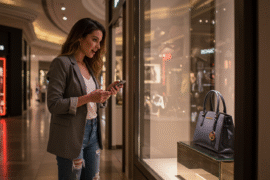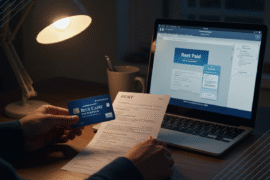This article may contain references to products or services from one or more of our advertisers or partners. We may receive compensation when you click on links to those products or services. Nonetheless, our opinions are our own.
- Key Highlights
- Introduction
- Understanding Impulse Buying and Spending Emotions
- The Psychology Behind Impulse Purchases
- Emotional Triggers That Lead to Unplanned Spending
- The Impact of Impulse Buying on Personal Finance
- Beginner’s Guide to Breaking the Cycle
- Conclusion
- Frequently Asked Questions
- Recommended Reads
Key Highlights
- Know the differences between impulse buying and emotional spending.
- Learn about the thoughts and feelings that drive unplanned purchases.
- See how impulse buying affects your money in the short and long run.
- Look at real examples of emotional spending and what happens because of it.
- Get helpful tips and a simple guide to help you manage your spending habits.
Introduction
We’ve all experienced the desire to get a deal that feels too good to miss. Buying on impulse and spending because of emotions are habits many people have. These can mess up budgets and set back money goals. But how can we tell the difference between enjoying a treat sometimes and getting stuck in a cycle of excess spending? In this article, we will look at what causes these behaviors, how they affect finances, and simple tips to take charge of spending habits.
Understanding Impulse Buying and Spending Emotions
Impulse buying is when you feel the need to buy something quickly without planning first. This usually happens because of appealing ads, special offers, or a strong wish to feel rewarded. The attitude of “treat yourself” can give a quick boost of happiness, making us feel good for a short time.
Emotional spending is guided by feelings, not by need. People often shop to feel better from stress, sadness, or boredom. They use shopping as a quick break from their emotions. But this can lead to feelings of regret and money problems. To stop this cycle, it is important to know how impulse buying is different from emotional spending.
The Psychology Behind Impulse Purchases
Our brain’s reward system is important in making impulsive purchases. When we spot something we want, dopamine—a chemical related to pleasure—flows, and we feel thrilled about buying it. Marketing tricks like flash sales, countdown timers, and scarcity alerts boost this feeling by creating a fear of missing out (FOMO).
Credit cards make it easy to buy things on impulse. You pay later, so you feel a gap between what you buy and how much money it costs. This can often cause people to spend too much because they don’t feel the weight of spending right away.
By knowing these psychological triggers, we can be more careful with our spending habits. This helps us create plans to avoid unwanted purchases.
Emotional Triggers That Lead to Unplanned Spending
Emotional buying usually comes from wanting to avoid or deal with bad feelings. A few of the main feelings that can lead to this behavior are:
- Stress—Shopping to feel better when work or life gets tough.
- Sadness—Buying things to help with feeling down.
- Boredom—Shopping to add fun to a dull day.
- Loneliness—Finding comfort in buying things when feeling alone.
Noticing these triggers helps us discover better ways to deal with our feelings. This way, we don’t have to use shopping to feel better.
The Impact of Impulse Buying on Personal Finance
Every now and then, it’s okay to treat yourself. However, buying things on a whim or spending to feel better can hurt your money situation. Little purchases that seem harmless can add up over time. This can lead to debt, missing your money goals, and feeling more stressed.
To create a safe and secure future with money, it’s important to match your spending with your long-term goals. Cutting down on impulsive buying helps you manage your money better. This way, you can have a more stable financial life.
Short-term Joy vs. Long-term Money Health
Impulse buying gives you a quick feel-good moment, but that feeling doesn’t last long. A lot of people feel regret or guilt after making these unnecessary buys, especially when they see how it affects their money.
In contrast, careful spending helps people feel secure with their money. By putting needs before wants and aiming for long-term goals, individuals can save money, lower their debt, and invest in experiences that bring true happiness.
True freedom with money comes from careful spending. It should match your values and your goals for the future.
Case Studies: Real-life Stories of Emotional Spending Mistakes
A survey by Deloitte in 2023 found that almost 80% of people around the world bought something extra in the last month to feel happier. They often did this even if it meant going over their budget. This was seen in all income levels:
| Demographic | Percentage Who Made a Splurge Purchase |
|---|---|
| Low-income (< $50k) | 71% |
| Middle-income ($50k – $99.9k) | 79% |
| High-income (over $100k) | 84% |
The study also showed that Millennials in the UK often take part in retail therapy. These results show how common emotional spending is and how it can hurt long-term money safety.
Beginner’s Guide to Breaking the Cycle
To stop impulse buying and spending for emotional reasons, you need to be aware, plan, and change your mindset. The first step is to know what makes you want to spend money. This helps you build better habits with your money.
Recognizing Your Impulse Buying Triggers
To stop impulse buying, begin by figuring out what makes you spend. Some stores, shopping online, or certain times of the day may make you want to buy without thinking.
Keeping a record of your spending in a journal or using budgeting apps can help you see patterns that you might not have seen before. After you find out what triggers your spending, you can use tips like stopping marketing emails, cutting back on online shopping, and staying away from places that tempt you to spend too much.
Step 1: Setting Financial Goals
Having well-defined financial objectives motivates us to resist impulsive purchases. Set clear aims, like saving for a house, paying down debt, or creating an emergency fund.
Write down your goals. Use a tracker, like a savings chart or vision board, to feel motivated. Checking your goals often reminds you why they matter and helps you stay on track with your money.
Step 2: Creating a Budget and Sticking to It
A good budget helps you spend wisely. Begin by closely monitoring your income and expenses. This will help you see where your money goes every month.
Group your spending and set aside money for it. Keep some funds free for unplanned costs. Budgeting tools and apps can make this easier. They can help you stick to your goals and change things when necessary.
Conclusion
Impulse buying and emotional spending can really affect your money situation. By knowing what causes your spending, having clear money goals, and making a budget, you can take charge of your finances. It’s okay to have treats now and then, but spending wisely helps you feel secure and calm about your money in the long run.
If handling quick spending seems too much, getting help from money experts can give useful tips to reach your money goals.
Frequently Asked Questions
How do I differentiate between a need and a want?
Needs are important for survival and feeling good, like food, a place to live, and health care. Wants can improve life, but they are not needed, like fancy things or fun events. Before buying something, think about whether it helps you feel better for a long time or just makes you feel good for a moment.
How can I stop spending too much when I go shopping for myself?
Make a budget before you go shopping and stick to it. Focus on what you need more than what you want. Take your time to think about your purchases before you decide to buy.
What are some ways to stop emotional spending?
Identify what makes you feel strong emotions. This includes things like stress or boredom. Find other ways to cope, such as exercising, relaxing your mind, or hanging out with friends. Getting help from a therapist can be good too.
Is it alright to treat myself now and then while I budget?
Yes, but being balanced is important. Set aside a small part of your budget for fun spending. This way, you can enjoy guilt-free purchases without money worries.
What tools can help me manage impulse spending?
Budgeting apps, expense trackers, and prepaid cards can help manage how you spend. Setting limits on your spending and using cash instead of a credit card can also help cut down on quick buys.

Reviewed and edited by Albert Fang.
See a typo or want to suggest an edit/revision to the content? Use the contact us form to provide feedback.
At FangWallet, we value editorial integrity and open collaboration in curating quality content for readers to enjoy. Much appreciated for the assist.
Did you like our article and find it insightful? We encourage sharing the article link with family and friends to benefit as well - better yet, sharing on social media. Thank you for the support! 🍉
Article Title: Impulse Buying and Emotional Spending: Ways to Break the Cycle
https://fangwallet.com/2025/03/04/impulse-buying/The FangWallet Promise
FangWallet is an editorially independent resource - founded on breaking down challenging financial concepts for anyone to understand since 2014. While we adhere to editorial integrity, note that this post may contain references to products from our partners.
The FangWallet promise is always to have your best interest in mind and be transparent and honest about the financial picture.
Become an Insider

Subscribe to get a free daily budget planner printable to help get your money on track!
Make passive money the right way. No spam.
Editorial Disclaimer: The editorial content on this page is not provided by any of the companies mentioned. The opinions expressed here are the author's alone.
The content of this website is for informational purposes only and does not represent investment advice, or an offer or solicitation to buy or sell any security, investment, or product. Investors are encouraged to do their own due diligence, and, if necessary, consult professional advising before making any investment decisions. Investing involves a high degree of risk, and financial losses may occur including the potential loss of principal.
Source Citation References:
+ Inspo
There are no additional citations or references to note for this article at this time.












































